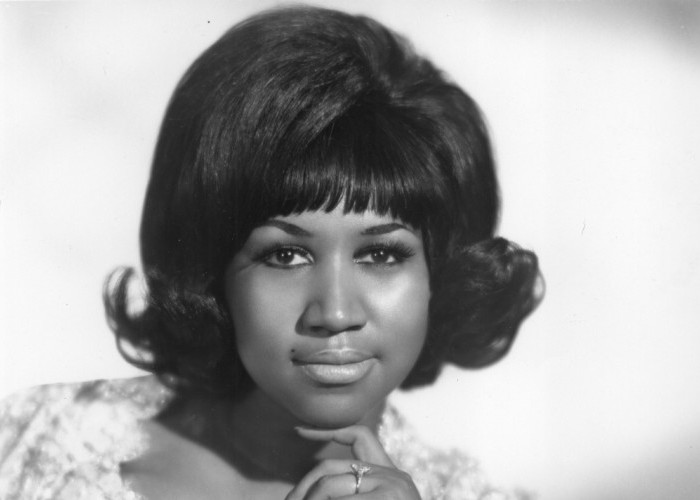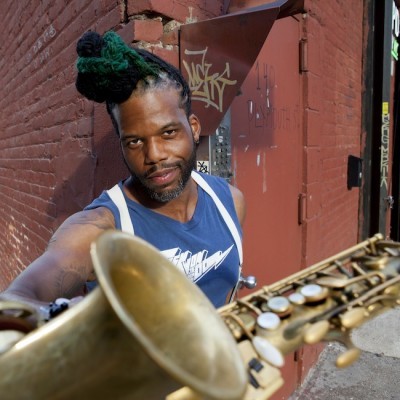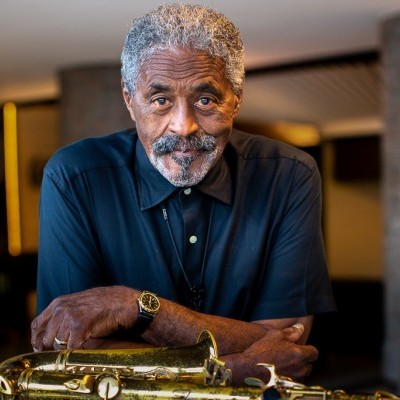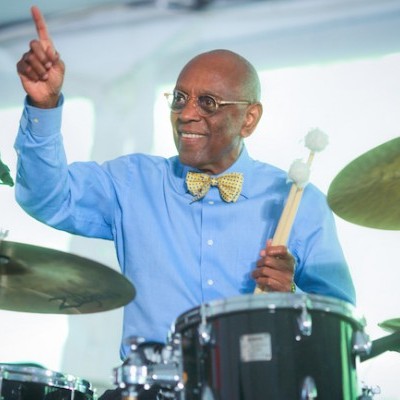Apr 2, 2024 12:59 PM
Saxophonist, Sonic Explorer Casey Benjamin Dies at 45
Casey Benjamin, the alto saxophonist, vocalist, keyboardist and producer who stamped his distinctive sounds on the…

Aretha Franklin (1942–2018)
(Photo: DownBeat Archives/Atlantic Records)She was the little girl who would be queen. Graced with a huge voice and even more powerful spirit, Aretha Franklin claimed her throne as the dominant female vocalist of her generation and a beloved cultural heroine.
During the past year she canceled a series of performances in New Jersey, New Orleans and Chicago. And recently, news that the 76-year-old Queen of Soul was gravely ill and in hospice care in Detroit, surrounded by family and friends, circulated. Franklin died Thursday at her home, according to various reports.
In the early 1950s, Franklin began singing solos in the Detroit church led by her father, the Rev. C.L. Franklin, a gospel singer in his own right known as the Man With the Million-Dollar Voice. Franklin’s mother, Barbara, a gospel singer, was out of the picture by the time Aretha was 6, and died four years later. Her father began managing Franklin when she was 14, and her audience no longer was confined to the 4,500 congregants of the New Bethel Baptist Church.
She began performing on C.L.’s “gospel caravan” tours, and with his help, landed a recording deal with J.V.B. Records, which issued her first album, Songs Of Faith, in 1956. She sometimes traveled with the Caravans and the Soul Stirrers. It was a life-changing event when she observed how young people reacted to the talent and charisma of the Soul Stirrers’ lead vocalist, Sam Cooke.
“When I saw he went pop, you know, outside church, that’s what made me say, ‘I want to sing that stuff, too,’” she told Gerri Hirshey, author of Nowhere to Run: The Story of Soul Music.
When she was 18, C.L. acceded to her wishes and helped her prepare a two-song demo with an eye toward landing a contract with a secular record company. If the auto industry was the engine that powered Detroit’s economy, music soon became its second-biggest export. But fledgling Detroit-based soul label Motown and its Tamla imprint lost out to industry powerhouse Columbia for the young dynamo.
We have lost one of the great artists of our time. Aretha Franklin was one of God’s precious gifts to the world—one of God’s shining jewels. She is deeply loved by millions of people as the Queen of Soul. Her voice is still a guiding light to vocalists today.
— John Lewis (@repjohnlewis) August 16, 2018
Rest In Peace to our Queen of Soul. Her contribution to music and to the empowerment and enrichment of our hearts, Spirits and souls is immeasurable.
Thank you Ms. Aretha Franklin for sharing your anointed gifts with us. They changed the world. We are deeply grateful!♥️MLH
— Ms. Lauryn Hill (@MsLaurynHill) August 16, 2018
Columbia released 10 studio albums by Franklin from 1961–’67, three of which reached the top 10 on Billboard’s R&B chart. But at Columbia, Franklin’s soulful voice was used to sing lushly orchestrated standards. With her move to Atlantic in 1967, she was off and running as a crossover superstar. Her affiliation with producer and Atlantic executive Jerry Wexler, and her sole session at the famed Muscle Shoals studio, yielded some of her greatest work. She scored nine Billboard Top 10 pop hits in her first year at Atlantic, starting with “I Never Loved A Man (The Way I Love You).” The album of the same title reached No. 2 on the pop chart, which tied 1968’s Lady Soul as her highest-charting LP. Her workup of Otis Redding’s “Respect” topped the singles chart, and Don Covay’s “Chain Of Fools” shot to No. 2 for Franklin. But her next 10 singles failed to make the Top 10, and only eight reached that lofty status for the rest of her career.
A gifted pianist and composer, Franklin’s repertoire included work by other songwriters, as well pieces that she wrote by herself and in collaboration with other tunesmiths.
Franklin enjoyed a spike of popularity in 1985 and reached new generations of fans, thanks to a string of hit singles on the pop charts: “Freeway Of Love,” “Who’s Zoomin’ Who?” and “Sisters Are Doin’ It For Themselves” (a collaboration with pop duo the Eurythmics).
A Brand New Me, her 42nd studio album, was released in 2017 by Rhino and Atlantic, and featured lush orchestral arrangements of her iconic vocal recordings. But it always was onstage that she was particularly dazzling.
Aretha Live At Fillmore West, recorded in May 1971 with the singer backed by King Curtis & the King Pins, perhaps best captures the glory of a Franklin live performance. The album had its share of pop hits, including “Bridge Over Troubled Water” and “Love The One You’re With,” but still offers a raw, insistent quality missing from many of her studio efforts. Before a Bay Area audience weaned on the Grateful Dead, though, Franklin never was more soulful. She later called the three-night engagement the highlight of her career. Her live 1972 Amazing Grace, which former DownBeat Reviews Editor Aaron Cohen wrote a book on, is the top-selling gospel album in history.
Among her accolades are 18 Grammy awards and induction into the Rock & Roll Hall of Fame in 1987.
As testimonials poured in from fellow musicians and admirers, plans were announced for a Nov. 14 tribute concert in Madison Square Garden. Sony Music Chief Creative Officer Clive Davis, who signed Franklin to his Arista label in 1980 and remained her close friend, reportedly had been planning the event before the singer’s illness was disclosed earlier in August. DB

Benjamin possessed a fluid, round sound on the alto saxophone, and he was often most recognizable by the layers of electronic effects that he put onto the instrument.
Apr 2, 2024 12:59 PM
Casey Benjamin, the alto saxophonist, vocalist, keyboardist and producer who stamped his distinctive sounds on the…

“He’s constructing intelligent musical sentences that connect seamlessly, which is the most important part of linear playing,” Charles McPherson said of alto saxophonist Sonny Red.
Feb 27, 2024 1:40 PM
“I might not have felt this way 30 to 40 years ago, but I’ve reached a point where I can hear value in what people…

Albert “Tootie” Heath (1935–2024) followed in the tradition of drummer Kenny Clarke, his idol.
Apr 5, 2024 10:28 AM
Albert “Tootie” Heath, a drummer of impeccable taste and time who was the youngest of three jazz-legend brothers…

“Both of us are quite grounded in the craft, the tradition and the harmonic sense,” Rosenwinkel said of his experience playing with Allen. “Yet I felt we shared something mystical as well.”
Mar 12, 2024 11:42 AM
“There are a few musicians you hear where, as somebody once said, the molecules in the room change. Geri was one of…

Henry Threadgill performs with Zooid at Big Ears in Knoxville, Tennessee.
Apr 9, 2024 11:30 AM
Big Ears, the annual four-day music celebration that first took place in 2009 in Knoxville, Tennessee, could well be…